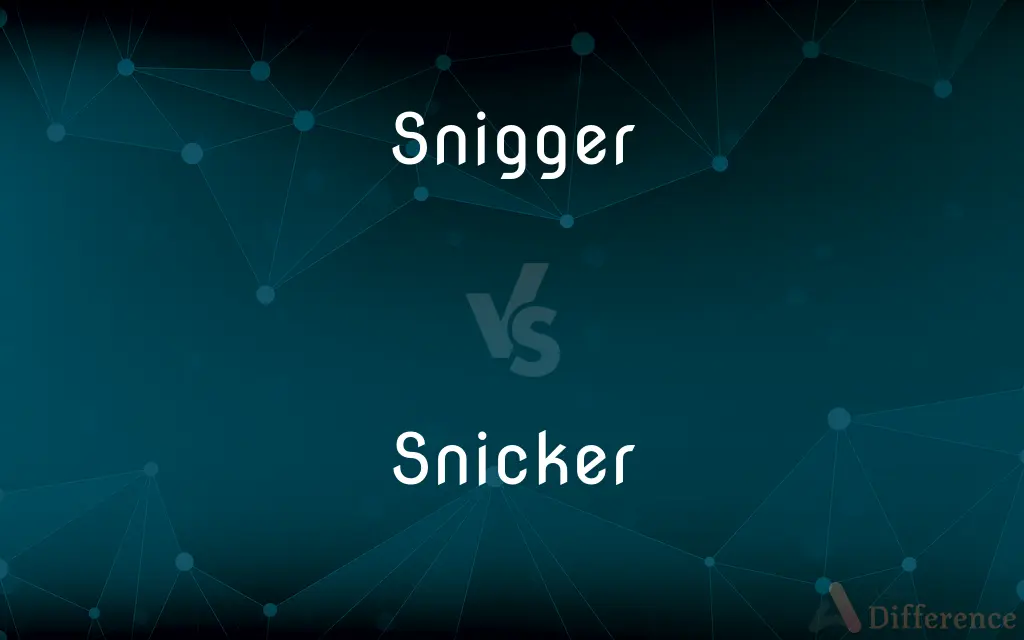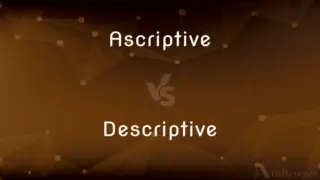Snigger vs. Snicker — What's the Difference?
By Tayyaba Rehman — Updated on October 20, 2023
Both words mean a suppressed or half-suppressed laugh; "snigger" is more common in British English while "snicker" is more common in American English.

Difference Between Snigger and Snicker
Table of Contents
ADVERTISEMENT
Key Differences
In British English, the term Snigger is more prevalent, whereas Snicker is primarily an American English term. However, both words are understood in either region.
Historically, Snigger and Snicker have been used interchangeably. Their etymologies are somewhat murky, but they have been present in the language for several centuries, often describing quiet or covert laughter.
Both Snigger and Snicker can be used as nouns and verbs. For instance, one might "snigger" or "snicker" at a joke, or one might hear a "snigger" or "snicker" from the back of the room.
Contextually, both words can be used in both light-hearted and negative connotations. A Snigger might be seen as more sly or sneaky, while a Snicker might be seen as more playful or cheeky, though this can vary based on the situation.
Comparison Chart
Origin
More commonly British
Primarily American
ADVERTISEMENT
Type of Laugh
Short, suppressed
Short, suppressed
Parts of Speech
Noun, Verb
Noun, Verb
Connotation
Can be sly or sneaky
Often seen as playful or cheeky
Usage in Literature
Found in older British literature
More prevalent in American texts
Compare with Definitions
Snigger
A quiet, restrained laugh or chuckle.
She heard a snigger from the back of the classroom.
Snicker
A short, suppressed laugh or chuckle.
He let out a snicker when the cat missed its jump.
Snigger
A secretive or sly chuckle.
He gave a snigger when he saw the typo.
Snicker
A quiet expression of amusement or derision.
There was a snicker among the audience members.
Snigger
A laugh expressing ridicule or contempt.
His comment was met with sniggers from the audience.
Snicker
A secretive or sly laugh.
I heard a snicker when the teacher's back was turned.
Snigger
To laugh in a half-suppressed manner.
I couldn't help but snigger at the scene.
Snicker
To utter a partly stifled laugh
"I have seen the eternal Footman hold my coat, and snicker" (T.S. Eliot).
Snigger
A snicker.
Snicker
A partly stifled laugh.
Snigger
To snicker.
Snicker
A stifled or broken laugh.
Snigger
A partly suppressed or broken laugh.
Snicker
A player who snicks the ball.
Snigger
A sly or snide laugh.
Snicker
(intransitive) To emit a snicker, a stifled or broken laugh.
Snigger
(intransitive) To emit a snigger.
Snicker
(transitive) To utter through a laugh of this kind.
Snigger
See Snicker.
Snicker
(of a horse) To whinny.
Snigger
See Snicker.
Snicker
To laugh slyly; to laugh in one's sleeve.
Snigger
A disrespectful laugh
Snicker
To laugh with audible catches of voice, as when persons attempt to suppress loud laughter.
Snigger
Laugh quietly
Snicker
A half suppressed, broken laugh.
Snigger
To laugh covertly or quietly.
She tried to snigger discreetly during the speech.
Snicker
A disrespectful laugh
Snicker
Laugh quietly
Snicker
To laugh in a playful or mischievous manner.
The kids snickered as they played their prank.
Snicker
To chuckle especially from amusement or nervousness.
She snickered nervously during the tense scene.
Common Curiosities
How is Snicker different from Snigger?
Snicker and Snigger have similar meanings, but Snicker is more common in American English.
What does Snigger mean?
Snigger refers to a suppressed or sneaky laugh.
Can I use Snigger and Snicker interchangeably?
While their meanings overlap, regional preferences may make one more suitable than the other.
Is it rude to Snigger or Snicker at someone?
In many contexts, it can be considered impolite or mocking.
Are there any idioms involving Snigger or Snicker?
Not widely recognized ones, but they can appear in various expressions or literary contexts.
Is Snigger a noun or verb?
Snigger can be used both as a noun and a verb.
Is Snigger more British and Snicker more American?
Yes, Snigger is more common in British English and Snicker in American English.
Can both words be used in negative contexts?
Yes, both can indicate derision or mockery.
Which word is older, Snigger or Snicker?
Both have been in the language for centuries and their origins are somewhat murky.
Is it common to hear Snicker in British literature?
While it's understood, Snigger is more prevalent in British texts.
What is the verb form of Snicker?
The verb form is "to snicker," as in "he snickered at the joke."
Which word has a more playful connotation, Snigger or Snicker?
Snicker often has a more playful connotation, while Snigger can be seen as more sly or sneaky.
Can animals Snigger or Snicker?
While animals don't laugh in the human sense, the terms can be used figuratively to describe similar sounds.
How can I use Snigger in a sentence?
"I heard a snigger from the crowd when he tripped."
Do Snigger and Snicker have the same etymology?
Their exact etymologies are unclear, but they've both been used for several centuries to describe suppressed laughter.
Share Your Discovery

Previous Comparison
Yolked vs. Yoked
Next Comparison
Ascriptive vs. DescriptiveAuthor Spotlight
Written by
Tayyaba RehmanTayyaba Rehman is a distinguished writer, currently serving as a primary contributor to askdifference.com. As a researcher in semantics and etymology, Tayyaba's passion for the complexity of languages and their distinctions has found a perfect home on the platform. Tayyaba delves into the intricacies of language, distinguishing between commonly confused words and phrases, thereby providing clarity for readers worldwide.













































